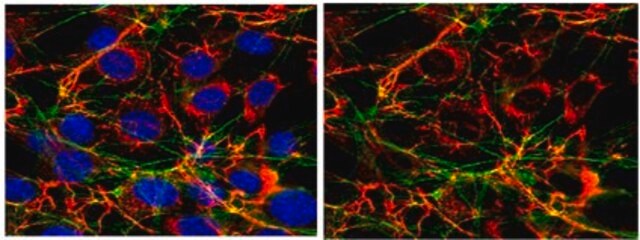SAB4200401
Anti-CTGF antibody, Mouse monoclonal
clone CTGF-14, purified from hybridoma cell culture
Synonym(e):
Monoclonal Anti-CCN family member 2, Monoclonal Anti-CCN2, Monoclonal Anti-CTGF antibody produced in mouse, Monoclonal Anti-Connective tissue growth factor, Monoclonal Anti-HCS24, Monoclonal Anti-Hypertrophic chondrocyte-specific protein 24, Monoclonal Anti-IBP-8, Monoclonal Anti-IGF-binding protein 8, Monoclonal Anti-IGFBP-8, Monoclonal Anti-IGFBP8, Monoclonal Anti-Insulin-like growth factor-binding protein 8, Monoclonal Anti-NOV2
About This Item
Empfohlene Produkte
Biologische Quelle
mouse
Konjugat
unconjugated
Antikörperform
purified from hybridoma cell culture
Antikörper-Produkttyp
primary antibodies
Klon
CTGF-14, monoclonal
Form
buffered aqueous solution
Mol-Gew.
antigen ~38 kDa
Speziesreaktivität
human
Konzentration
~1.0 mg/mL
Methode(n)
immunoprecipitation (IP): suitable
western blot: 0.25-0.5 μg/mL using whole extracts of HEK-293T cells over-expressing CTGF.
Isotyp
IgG1
UniProt-Hinterlegungsnummer
Versandbedingung
dry ice
Lagertemp.
−20°C
Posttranslationale Modifikation Target
unmodified
Angaben zum Gen
human ... CTGF(1490)
Allgemeine Beschreibung
Spezifität
Immunogen
Anwendung
Biochem./physiol. Wirkung
Physikalische Form
Lagerung und Haltbarkeit
Haftungsausschluss
Not finding the right product?
Try our Produkt-Auswahlhilfe.
Empfehlung
Lagerklassenschlüssel
10 - Combustible liquids
Flammpunkt (°F)
Not applicable
Flammpunkt (°C)
Not applicable
Analysenzertifikate (COA)
Suchen Sie nach Analysenzertifikate (COA), indem Sie die Lot-/Chargennummer des Produkts eingeben. Lot- und Chargennummern sind auf dem Produktetikett hinter den Wörtern ‘Lot’ oder ‘Batch’ (Lot oder Charge) zu finden.
Besitzen Sie dieses Produkt bereits?
In der Dokumentenbibliothek finden Sie die Dokumentation zu den Produkten, die Sie kürzlich erworben haben.
Unser Team von Wissenschaftlern verfügt über Erfahrung in allen Forschungsbereichen einschließlich Life Science, Materialwissenschaften, chemischer Synthese, Chromatographie, Analytik und vielen mehr..
Setzen Sie sich mit dem technischen Dienst in Verbindung.








